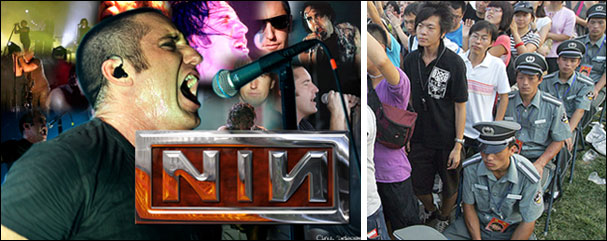|
|
| |
Rock
tours target China, face government interference
|
| |
 |
| |
Last
september, 30,000 people gathered in Beijing's Chaoyang Park to hear
sets by Nine Inch Nails, Public Enemy and the New York Dolls, at the
third annual Beijing Pop Festival. The show - as well as other recent
performances by acts like the Rolling Stones and Linkin Park - seemed
to be a sign of China's increasing comfort with Western pop culture.
That all changed when Björk was booked in Shanghai in March -
and finished her set with the defiant song "Declare Independence"
before trying to lead the crowd in a chant of "Tibet! Tibet!"
The Chinese authorities' reaction was swift: The Ministry of Culture
accused the singer of "going against professional standards"
and later announced that no foreign rock acts would be allowed to
play until after the Beijing Olympics. In July, they banned any "individuals
who have ever engaged in activities which threaten our national sovereignty."
Gigs by Avril Lavigne and Good Charlotte have been postponed, and
this summer's Beijing Pop Festival was canceled. According to concert-industry
sources, the Björk incident convinced the government that rock
stars could easily damage the country's carefully managed image during
the run-up to this summer's Olympics. "Suddenly they got restrictive
again," says CAA booking agent Marlene Tsuchii, who has helped
organize Chinese tours by everyone from Il Divo to Sonic Youth. "With
the Olympics and the Tibet thing, it's bad timing. Everybody backed
off."
The crackdown comes at a time when China's appetite for Western pop
culture is growing rapidly. Since Wham! played in Beijing in 1985,
the trickle of artists allowed into the country has become a flood,
with recent shows by the Stones, Eric Clapton, Roger Waters, Beyoncé
and the Yeah Yeah Yeahs. "China is the quintessential emerging
market," says NIN manager Jim Guerinot.
And even more telling, top American concert promoters Live Nation
and AEG opened offices there in 2005. Last year, Ticketmaster acquired
a majority share in Emma Entertainment, the Beijing company that brought
over the Stones and Clapton. "We want to become part of the local
industry," says Colleen Ironside, head of Live Nation's Asia
office.
But even if the musical embargo is lifted after the Olympics, as industry
sources expect, booking shows in China presents a set of unique challenges.
The months-long process begins with a local promoter who, after approaching
an artist, gathers background information on the act for the government:
song lyrics, biographical information and a probable set list for
the concerts. The promoter then sends the packet to the Ministry of
Culture, the agency that issues licenses to events. "China wants
to be part of the modern world, and they don't want to be seen as
prohibiting international talent," says one promoter, who spoke
anonymously for fear of reprisals. "On the other hand, they want
to maintain control over what sort of talent is promoted."
Some acts, like Linkin Park and NIN, were cleared with no problems.
But an attempted Jay-Z concert in 2006 was nixed over concerns about
vulgar lyrics. That same year, the Stones had to cut four songs from
their set, including "Let's Spend the Night Together" and
"Honky Tonk Women." Even if an act is approved, the government
is never far behind. Before NIN's performance last fall, an official
asked Trent Reznor not to mention Tibet. Lavigne was asked - "politely,
but very firmly," says her manager Terry McBride - not to swear
onstage when she played Shanghai last year. If a performer breaks
the law, as Björk technically did, sources say promoters will
have to give the government half of the box-office receipts. "You
have to be very respectful of how they do things," says McBride.
"You have to approach the Chinese market differently."
Another hurdle is the country's entertainment infrastructure, which
remains below international standards. Many bands opt to fly in their
own gear, and soundchecks can stretch on for hours. "You have
to do production for every show in advance, and you have to build
stages everywhere," says Archie Hamilton, a promoter who has
brought Sonic Youth and Talib Kweli to China. "It's an expensive
thing."
Superstar acts playing arenas can charge as much as the $250 Beyoncé
did for VIP tickets to her 2007 show. But with over 128 million people
living on less than a dollar a day and even financial-industry professionals
making as little as $14,000 a year, many artists sell tickets for
far less than they would at home. "You can't charge high prices
because they're not accustomed to paying them," says CAA's Tsuchii.
Linkin Park tickets started at $12; last year's Modern Sky festival,
which featured the Yeah Yeah Yeahs, charged $15; the Beijing Pop Festival
cost $25. Low prices, however, don't mean that bands won't reap rewards
in China. NIN made about $200,000 for their set; asked about reports
that Linkin Park earned $750,000, singer Chester Bennington says,
"It cost us a lot of money to play there, and we're not going
to play for free."
Still, Bennington feels their trip was worth the occasional compromise.
"We knew the rules," he says. "Be polite. Don't try
to incite a riot. Don't be political. I'm not saying I don't believe
the people of Tibet don't deserve to be free. But everywhere in the
world, there's shit that needs to be better. Doesn't mean we shouldn't
play rock shows there."
David Browne
Rock 'n' Roll Daily
|
| |
|

